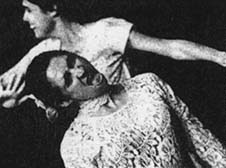
- Performing Arts Journal May 1998
- Performing Arts Journal May 1998
- de Volkskrant May 25, 1998
- de Volkskrant May 25, 1998
- Le Soir May 25, 1998
- Le Soir May 25, 1998
- Performing Arts Journal November 1997
- Salzburger Nachrichten August 13, 1997
- Salzburger Nachrichten August 13, 1997
North America – Full Article
by Tish Dice
Some directors’ gimmickry with Shakespeare and other classics at least relieves the monotony of seeing our 40th Hamlet or our 28th Twelfth Night. It may even cause us to look afresh at such old favourites and detect in them riches we have missed before. Playing games with a script most of us don’t know, however, can prove counterproductive. David Herskovits’s folly tampering with Preston Sturges’s Strictly Dishonourable lies in part with our unfamiliarity with this 1929 Broadway hit (and with the films Sturges made of it in 1931 and 1951) and also with the silliness with which Target Margin’s director has piled Richard Foreman’s mannerisms onto a frothy comedy of manners which ought to eschew such -isms. Herskovits might more profitably have given us a Brechtian Country Wife or an Artaudian School for Scandal; at least most of us would have brought to such productions familiarity with the original script.
For this Sturges speakeasy romance, the director’s punctuating laugh-lines with bells and ensemble freezes guarantees we won’t enjoy a good joke, if, that is, the generally amateurish cast has succeeded in communicating it. Rising above the proceedings occasionally, Mary Neufeld brings a sense of fun to her cross-dressed Judge, the physically miscast Steven Rattazzi’s sincerity as the Count eventually wins our sympathy, and Patricia Dunnock as the irresistible Isabel with a strong will of her own convinces us she belongs in somebody else’s more debonair and carefree production.
Whereas Target Margin claims to revive lost American classics, Elevator Repair Service, performing at P.S. 122, merely credits eclectic sources employed to produce a new and uniformly experimental work called Cab Legs. Some key ERS members also work with Target Margin, but ERS’s utter lack of adherence to primary inspiration — in this instance, Tennessee Williams’ Summer and Smoke and its revision as Eccentricities of a Nightingale — produces a superior result.
Working in the spirit of the Wooster Group, ERS collectively creates an evening combining snippets of Williams, Truffaut, Betty Boop, Cab Calloway, Bach, east Indian films and music, and more besides — all refracted through an anarchic spirit somehow shaped by artistry into a vision of sexual repression released in frenzied group orgasm. ERS achieves, not some imitation of Liz Lecompte’s Wooster Group creations, but a wacky and worthy competition in that genre, combining an entertaining collage of music, shaking bodies, whispered dialogue just barely comprehensible, long pauses, intrusions by a dork evidently bewildered by the avant-garde, and clearly audible conversations. They also make imaginative use of off-stage spaces to augment their soundtrack.
This mixture conveys clearly Linda (ie Williams’ Alma) grappling with the conflict between acceptable behaviour for a spinster in 1947 and personal fulfilment. Indeed, when she finally speaks her mind — ‘Respect is such a good thing, but not if it means I can’t have sex’ — she expresses what the young woman in Strictly Dishonourable likewise concludes. Linda captures our hearts much earlier than this, however, when, in a somewhat improvised monologue, she rambles on to the man she hopelessly adores about the remarkable attributes of doctors in general and the object of her obsessive love in particular. She even, in a sadistically comic touch, surmises he must as a child have broken small animal’s bones so as to learn to repair them. Cab Legs, in short, both sends up Williams and creates its own bacchanalian vision of a repressed libido liberated. Hats off to director John Collins, head writer/co-director Steve Bodow, Rinne Groff as Linda and all of ERS, a now formidable force on the experimental scene.